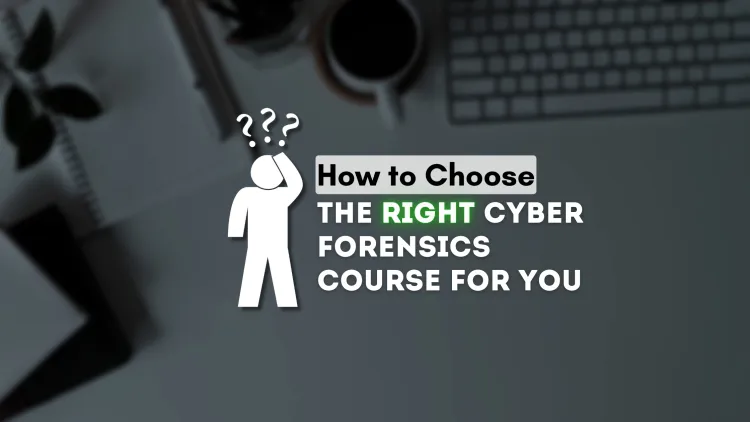How to Choose the Right Cyber Forensics Course for You
Choosing the right cyber forensics course is a crucial step in building a successful career in digital forensics and cybersecurity. By considering factors like course content, industry recognition, hands-on training, and career support, you can select a program that aligns with your professional goals. Whether you’re a beginner or an experienced professional, investing in a reputable course will equip you with the skills and certifications needed to thrive in this dynamic and rewarding field. Take the first step today and become a vital asset in the fight against cybercrime.

In today’s rapidly evolving digital landscape, cyber forensics has emerged as a pivotal field. Professionals skilled in this area are tasked with recovering digital evidence, investigating cybercrimes, and fortifying digital systems against future attacks. If you’re planning to kickstart or advance your career in this domain, selecting the right cyber forensics course is critical. This guide will help you identify the best course tailored to your needs and career aspirations.
Why Choosing the Right Course Matters
With the proliferation of cyber threats, organizations demand skilled professionals who can handle digital evidence and maintain cybersecurity protocols. The right cyber forensics course can:
-
Provide you with the foundational knowledge and advanced skills required.
-
Equip you with certifications recognized by leading employers.
-
Offer hands-on experience with industry-standard tools.
-
Open doors to high-paying job opportunities.
Key Factors to Consider When Choosing a Cyber Forensics Course
1. Define Your Career Goals
Before enrolling in a course, clarify your career aspirations:
-
Do you want to specialize in malware analysis, network forensics, or incident response?
-
Are you aiming for a certification to boost your job prospects?
-
Do you envision working in law enforcement, private sector security, or cybersecurity firms?
Clearly defining your goals will help you choose a course that aligns with your ambitions.
2. Evaluate Course Content
The course should cover essential topics such as:
-
Digital evidence handling
-
Data recovery techniques
-
Incident response planning
-
Training on tools like EnCase, FTK, and Wireshark
Courses that balance theoretical knowledge with practical application are ideal for a holistic learning experience.
3. Check Industry Recognition
Opt for courses accredited by leading organizations, including:
-
GIAC (Global Information Assurance Certification)
-
ISFCE (International Society of Forensic Computer Examiners)
-
SANS Institute
Certifications from these bodies are highly regarded by employers and can significantly enhance your resume.
4. Prioritize Hands-On Training
Practical experience is crucial in cyber forensics. Look for courses that provide:
-
Real-world case studies and simulations
-
Access to cutting-edge forensic tools
-
Labs for practicing investigations and evidence recovery
Hands-on training ensures you’re prepared to tackle real-life scenarios confidently.
5. Consider Course Duration and Flexibility
Depending on your current commitments, choose a course that fits your schedule:
-
Short-term courses (4–12 weeks) for quick upskilling
-
Self-paced online courses for flexibility
-
Comprehensive degree programs for in-depth knowledge
Flexibility is essential, especially for working professionals.
6. Compare Costs and Value
While some courses are free, others come at a premium. Consider:
-
The course fee versus the value of skills and certifications you’ll gain
-
Additional benefits like lifetime access to materials or networking opportunities
Investing in a high-quality course can yield significant long-term career benefits.
7. Read Reviews and Testimonials
Feedback from previous participants provides insights into:
-
The quality of the course material
-
Instructor expertise
-
The real-world applicability of the skills taught
Positive reviews and high ratings are good indicators of a reliable course.
8. Look for Career Support Services
Some courses offer career assistance, including:
-
Resume building
-
Interview preparation
-
Networking opportunities with industry professionals
These services can help you transition seamlessly from learning to employment.
Popular Cyber Forensics Courses to Consider
1. Certified Computer Forensics Examiner (CCFE)
-
Provider: ISFCE
-
Ideal For: Beginners and mid-level professionals
-
Key Topics: Data recovery, file system analysis, legal aspects
2. GIAC Certified Forensic Analyst (GCFA)
-
Provider: GIAC
-
Ideal For: Security professionals handling complex investigations
-
Key Topics: Advanced disk forensics, memory analysis, network traffic analysis
3. EnCase Certified Examiner (EnCE)
-
Provider: OpenText
-
Ideal For: Professionals specializing in EnCase forensic tools
-
Key Topics: Evidence recovery, file signature analysis, reporting.
FAQs
-
What is cyber forensics? Cyber forensics involves the identification, recovery, and analysis of digital evidence to investigate cybercrimes.
-
Why is choosing the right course important? The right course provides essential skills, certifications, and hands-on experience for a successful career.
-
Which certifications are most valued in cyber forensics? Certifications like GCFA, CCFE, and EnCE are highly regarded.
-
Can I pursue cyber forensics without prior IT experience? Yes, many beginner-friendly courses cater to individuals without an IT background.
-
Are online courses as effective as in-person training? Online courses with hands-on labs and real-world case studies can be just as effective.
-
How long does it take to complete a cyber forensics course? Duration varies, ranging from a few weeks to several months, depending on the course type.
-
What tools will I learn in a cyber forensics course? Common tools include EnCase, FTK, Wireshark, and Autopsy.
-
What career roles can I pursue after completing a course? Roles include Digital Forensic Analyst, Incident Responder, and Malware Analyst.
-
Are cyber forensics jobs in demand? Yes, the demand for skilled cyber forensics professionals is growing rapidly.
-
What is the average salary for a cyber forensics expert? Salaries range from $70,000 to over $120,000, depending on experience and certifications.












![Top 10 Ethical Hackers in the World [2025]](https://www.webasha.com/blog/uploads/images/202408/image_100x75_66c2f983c207b.webp)

![[2025] Top 100+ VAPT Interview Questions and Answers](https://www.webasha.com/blog/uploads/images/image_100x75_6512b1e4b64f7.jpg)









